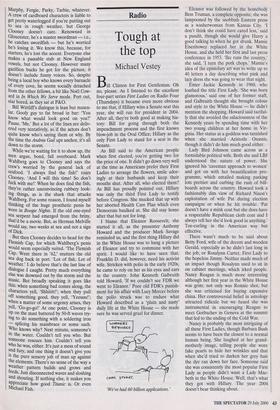Radio
Tough at the top
Michael Vestcy
Bill Clinton for First Gentleman. Oh no, please. As I listened to the excellent four-part series First Ladies on Radio Four (Thursdays) it became even more obvious to me that, if Hillary wins a Senate seat this year, she will run for president in 2004. After all, they're both good at making his- tory: Bill for going through both the impeachment process and the first known blow-job in the Oval Office; Hillary as the only First Lady to stand for a seat in the Senate.
As Bill said to the American people when first elected, you're getting two for the price of one. It didn't go down very well at the time as Americans prefer their First Ladies to arrange the flowers, smile ador- ingly at their husbands and keep their mouths shut. After all, who elected them? As Bill has proudly pointed out, Hillary was only the third First Lady to testify before Congress. She mucked that up with her aborted Health Care Plan which even Democrats baulked at. She did stay home after that but not for long.
I blame that Eleanor Roosevelt; she started it all, as the presenter Anthony Howard and the producer Mark Savage reminded us, and the first thing Hillary did in the White House was to hang a picture of Eleanor and try to commune with her spirit. I would like to have seen that. Franklin D. did, however, need his activist wife. Stricken with polio in the early 1920s, he came to rely on her as his eyes and ears in the country. John Kenneth Galbraith told Howard, 'If we couldn't see FDR we went to Eleanor.' Poor old FDR's punish- ment for his affair with Lucy Mercer before the polio struck was to endure what Howard described as a 'plain and nasty' daily life at the White House — she made sure he was served gruel for dinner.
`We've had 60 billion applications.' Eleanor was followed by the homebody Bess Truman, a complete opposite; she was lampooned by the snobbish Eastern press as a washerwoman from Kansas City. 'I don't think she could have cared less,' said a pundit, though she would give Harry a good talking to when he got drunk. Mamie Eisenhower replaced her in the White House, and she held her first and last press conference in 1953. 'Ike runs the country,' she said, 'I turn the pork chops.' Mamie's idea of the epistolary art was to write up to 40 letters a day describing what pink and lacy dress she was going to wear that night.
Enter Jackie Kennedy in 1960, who loathed the title First Lady. 'She was born glamorous,' said one of her former staff, and Galbraith thought she brought colour and style to the White House — he didn't mention the shopping. Howard said tactful- ly that she avoided the salaciousness of the Kennedy years by spending time with her two young children at her home in Vir- ginia. Her status as a goddess was tarnished when she married Aristotle Onassis, though it didn't do him much good either.
Lady Bird Johnson came across as a formidable political wife. Both she and LBJ understood the nature of power. She ignored his 'caveman approach to women' and got on with her beautification pro- gramme, which entailed making parking lots prettier and curbing the rash of bill- boards across the country. Howard took a fashionably dim view of Richard Nixon's exploitation of wife Pat during election campaigns or when he hit trouble: 'Pat doesn't have a mink coat but she does have a respectable Republican cloth coat and I always tell her she'd look good in anything.' Toe-curling in the American way but effective.
There wasn't much to be said about Betty Ford, wife of the decent and wooden Gerald, especially as he didn't last long in the job, or Rosalynn Carter, First Lady to the hopeless Jimmy. Neither made much of an impact though Rosalynn used to sit in on cabinet meetings, which irked people. Nancy Reagan is much more interesting although her first year in the White House was grim; not only was Ronnie shot, but she was criticised for buying expensive china. Her controversial belief in astrology attracted ridicule but we heard she was instrumental in encouraging Reagan to meet Gorbachev in Geneva at the summit that led to the ending of the Cold War.
Nancy is probably the most intriguing of all these First Ladies, though Barbara Bush seems to have been the closest to a normal human being. She laughed at her grand- motherly image, telling people she wore fake pearls to hide her wrinkles and that when she'd tried to darken her grey hair the dye ran down her face. Someone said she was consistently the most popular First Lady as people didn't want a Lady Mac- beth in the White House. Well, that's what they got with Hillary. The year 2004 doesn't bear thinking about.


























































 Previous page
Previous page